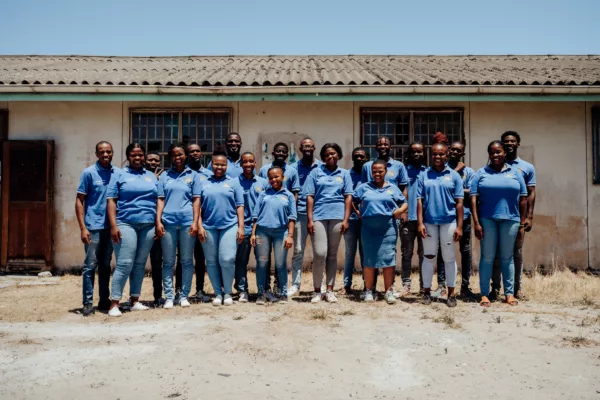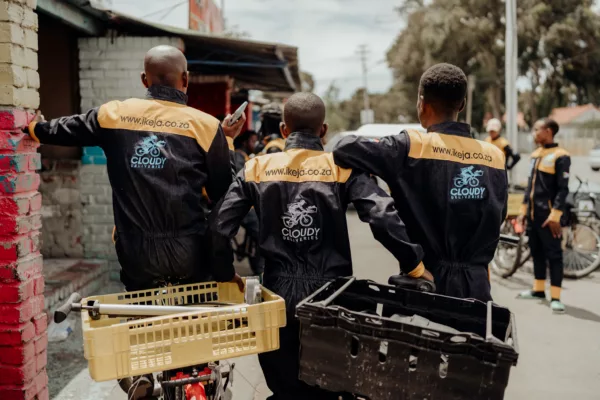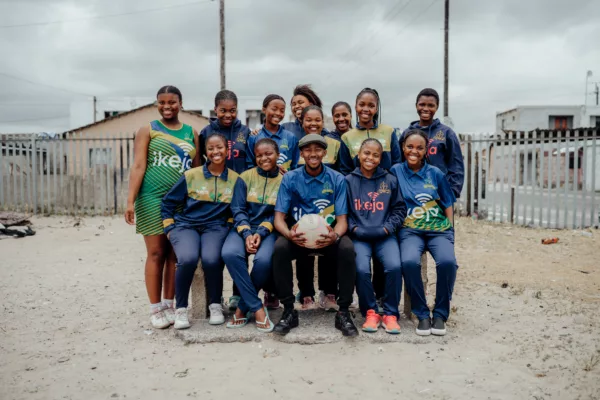The phrase “it takes a village to raise a child” comes from an African proverb and conveys the message that it takes many people – “the village” – to provide a safe, healthy environment for children where they are given the security they need to develop and flourish, and to be able to realize their hopes and dreams. It is the notion that caring for children is a shared responsibility among many.

It’s a Saturday morning in Ivory Park. Lord Khanyile stadium is alive and buzzing with spectators, live fires for the tshisa nyama, and men and women selling fruits and refreshments. Bishop Ridge Ndlovu, the tournament organizer, is only identifiable by the yellow hoodie he has on amongst the different casual wear that has filled this open land. Bishop explains that the tournament offers kasi soccer players, as well as soccer lovers an opportunity to compete professionally, build the sport and bring the public together while entertaining the community with “ubumnandi be Diski yase Kasi.”
“Every one of us has a social responsibility to care for our neighbor, children, and our community. Lerato Lamola Winter Games is not about me. It is a calling I take responsibly,” says Bishop. Ivory Park is no different from other townships in South Africa. Many families face multiple adversities. These adversities include mental illness, substance use and addiction problems, physical illness, domestic and community violence, and insecure housing. However, “the village” in many countries today is dissipated and fragmented, and individuals are increasingly isolated and are not eager to ask for, or provide help to, others.

“Lerato and I grew up here. The tournament was birthed here. So, we sat down and asked ourselves what we could do to give back to the place that carried us throughout our childhoods. Since its inception, the idea of giving back was parallel to the school shoes initiative – we donated our time with the tournament and shoes to the less fortunate in surrounding schools. And one of our requirements for participation in the tournament is to donate at least two pairs of shoes.”
In the last two years, Lerato Lamola Winter Sports have extended this initiative by asking for school trousers, shirts, and socks donations to give to children from disadvantaged backgrounds and homes. “Influence is currency. And as someone who is seen as that and understands and observes the social issues around Ivory, it becomes a duty to serve the people around me. If we can bring over five thousand people from around Gauteng to watch football over four weeks, then we would be able to encourage those same people to bring change in other people’s lives.”
There is a lot of preparation that goes into bringing this tournament to life; from finding the venue, having the teams, ensuring vendors have a section to sell, bringing in sponsors, and making sure everything runs accordingly. I asked Lerato, founder of Lerato Lamola Winter Sports, about where this all began for him.

“About nine years ago during the off-season when I used to play for Bloemfontein Celtics, and I was back home in Ivory Park. That’s when I noticed that an alarming number of schoolchildren who used to pass by my house on their way to school had torn school shoes. That negatively touched me,” says Lerato. We started a school kids shoes initiative collecting school shoes, and, in that way, we could donate shoes to neighboring schools.”
Initiatives like the one Lerato mentions are often tricky to execute to their full extent because of mistrust and exploitation, especially when it is hitting off the ground. “We do make sure that the donated shoes went straight to kids who were in need; or rather, families who could not afford to buy new school shoes for the children,” he continues. “There is no proper way to fully trust that it happens in the way you imagine it in the beginning, but this is a place we grew up in so by extension the trust is instinctive,” he continues.
Ivory Park is a place closest to both Bishop and Lerato’s hearts. Lerato, early in his soccer career, used to play in the same community fields and stadiums that they now run in this tournament. There’s no wonder that the impulse to lift and water younger soccer players comes easily. “People supported my career and the impulse to see a change here was a huge one because I am from these very streets. My childhood was never a deterrent. This village carried me throughout my childhood and adult life. The community that looks forward to this tournament each year is the same one that was instrumental in my growth. It’s not a one-man show. I wholeheartedly believe that I must lift the next person so that even when I am gone, they can lift my kids. That’s the intention. It is “Ubuntu” in its purest and original form,” concludes Lerato.

These are two young men who understand the idea of philanthropic work. It is something that is second nature to them. It means the “love of humanity”, and sometimes might be described as generosity. Between Bishop and Lerato, it is the gift of time, talent, and treasure towards the pursuit of making life better and bearable for others. It is not only the desire to promote welfare. Assistance and well-being for others, but the understanding that building each other is vital to the sustainability of the villages we occupy.
“There are colleagues, partners, and everyone we know today to show support and solidarity for our dream. If all this is possible for ourselves, then it is possible for our children, the next person, neighbors, families, other communities. It is far-reaching.” Lerato Lamola Winter Sports cements the notion that “the village” – in any context – is capable of and can provide the capacity to provide support and guidance to families with adversity.



